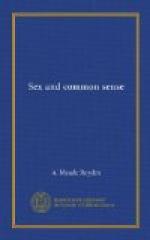No scientist can tell us how small-pox or tuberculosis or rheumatism first entered the world; but any scientist can tell us that by wrong living, wrong housing, wrong feeding, we can breed and spread and perpetuate disease. In other words, we are diseased not because we obey the laws of our nature but because we violate them: and though we can take the individual sufferer and (sometimes) cure him, we shall not get rid of the disease until we have learnt to obey those laws and to live rightly.
In just the same way the diseases of vice, though no one can say how they first came into the world, continue and flourish, not because of human nature, but because we violate some law of our own nature in what we do. We may even cure the individual; we may see a thousand struck and a thousand guilty escape; the fact remains that these diseases are bred in the swamp of immorality, just as certainly as malaria is bred in the mosquito-haunted pools of the malaria swamp. Drain the swamp, and you get rid of the malaria, for there is no longer any place for the malaria-bearing mosquito to breed. Drain the swamp of immorality, and you get rid of venereal disease, because there is no longer a place where these diseases can breed. Live rightly, and your nature will respond in health. When human beings elect to make their relations with one another promiscuous—when, that is to say, they treat themselves as animals—they are not obeying, they are violating the law of their own being; for they are not animals only, and to treat themselves as such is to disobey the law of their own nature. And disobedience reacts in disease.
So again, the relations of men and women are of the mind as well as of the body and the spirit. You cannot rule out your mind, and I think that those who believe, as many do today, not indeed in a merely animal promiscuity, but in rather casual relations between men and women—experiments, if you like, men and women passing from one union to another—rule out the fact that a human being has a mind, a memory and foresight; that our being includes a past, and, in a sense, includes a future also; and when you try to divorce your physical experience from your intellectual and emotional being you are again violating the law of your own nature.
I remember asking one of the most happily married women that I know to put into words, if she could, the reason why she believed that married people, married lovers, should not have gone through other relationships with other people before they gave themselves to one another. I asked her to express in words what seemed to her immoral. She wrote this: “In the ideal union between God and man, we know that man must give the fulness of his being, body, mind and spirit, throughout his whole life, to God, and that anything less than this, though it may be fine and noble, does fall short of perfection. It is the same with the human love of men and women. The ‘fulness of our being’ which we desire




